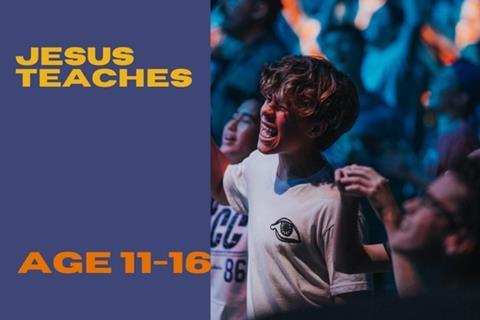
To download the PDF, click here.
BACKGROUND
It is easy to read this passage and not realise what it means for us personally. Some of us might have had lives where conflict and ‘enemies’ don’t play a huge role. However, there will be those in our groups - both young people and fellow leaders - for whom this passage could be a massive challenge. Be sensitive as you explore what this might mean to the people in your group. What difference will this make to people’s lives?
GATHERING TIME
10 minutes
You will need: refreshments; a comfortable place to sit and chat
As the young people arrive, serve them the refreshments you have provided. Try to have something a bit more interesting than biscuits and squash. Is there someone in your congregation who could bake a cake? Do you have the facilities to make tea and toast? Could you provide healthy snacks?
As you eat and drink together, chat about the young people’s lives. Do they have anything to share? Any triumphs? Any disasters? Share stories from your life, if appropriate.
BIBLE EXPLORATION
10 minutes
You will need: Bibles; pieces of card or paper with pre-written words (see below); pens
In pairs or maybe on their own, ask the young people to read through the passage a few times, and substitute references to ‘enemies’ with names or groups of people they find challenging (certainly not anyone present).
For example, I grew up in Ipswich. There is a strong football rivalry between Ipswich Town and Norwich City (sorry Norwich!). So, for me, the following might help my attitude: “But to you who are listening, I say: Love Norwich City players, do good to those who support Norwich City, bless those who curse Ipswich Town, pray for those who sing rude songs about us. If a Norwich fan slaps you on one cheek, turn to them the other also…”
This may need a bit of careful managing so that it doesn’t end up just being negative about other groups of people or individuals, but handled sensitively and positively this could be very helpful for the young people. Rather than reading the abstract ‘enemies’, naming the people they clash with in order to be more Christ-like towards them could be a massive eye-opener and challenge going forwards.
Once the members of your group have come up with a more specific and personalised passage, ask if anyone would like to share what they have written. What challenges does this bring up for them? Be sensitive as you discuss this, particularly as this might be a very real and ongoing challenge for some young people. Their ‘enemies’ might be members of their family, those who live around them or people at school.
In groups, list the things you love doing, from eating late-night cheese on toast to watching Robot wars. Have two sets of the following words printed out on small, equal-sized cards: parents, best friends, money, siblings, enemies, sport, time alone, popularity, those who hurt you, church, gaming, mobile phones, TV, clothes, music, art, coffee, pizza, ISIS, Donald Trump, ourselves. Ask the young people to organise these into a top ten in order of how important it is to love (so they can’t use all the cards). This should provide a great discussion about what and whom we love most, and how important it is to love those who don’t love us back or share our values.
CHATTING TOGETHER
10 minutes
Ask the group these questions, making sure everyone has the chance to contribute:
- Which part of what Jesus says here is the easiest to put into practice?
- Which part is the most challenging?
- How literal was Jesus being in what he said about cheeks and coats and shirts? What does that mean for us today?
- What does this passage tell you about Jesus and God’s kingdom?
- What do you want to say to Jesus because of what you’ve read?
- What difference is this going to make to your life?
Supporting documents
Click link to download and view these files794391.pdf
PDF, Size 0.25 mb











































